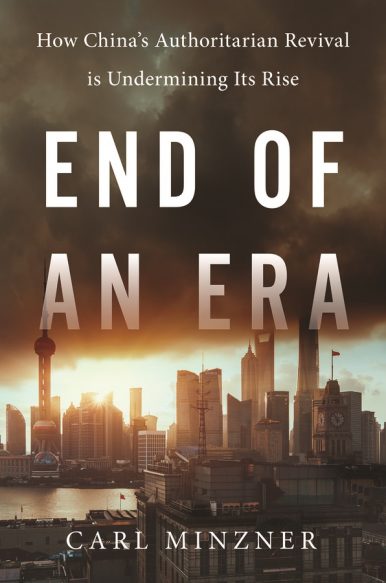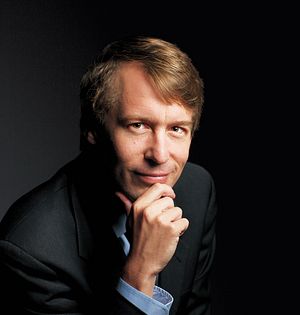Recent news out of China — from the end of presidential term limits to the extolling of Xi Jinping Thought — has observers worried. Slowly, China’s post-Mao norms of collective leadership, division of Party and state functions, and regular transfers of power are eroding. That process is the subject of End of an Era: How China’s Authoritarian Revival is Undermining Its Rise, the latest book by Carl Minzner.
In this interview, Minzner, Professor of Law at Fordham University School of Law, discusses his book in the context of the recently concluded National People’s Congress, which further cemented Xi’s status.
It’s common now to see comparisons between Mao Zedong and Xi Jinping, partially because the Party’s own language describing Xi (as the country’s “helmsman,” for example) has not been in vogue since the Mao era. But obviously the world is vastly different now than it was in the 1950s and ‘60s. How has Xi adapted his own brand of authoritarianism for a 21st century China that is increasingly active on the global stage?
Xi isn’t Mao… yet. Sure, Xi has steadily broken a whole host of reform-era political norms established by Deng and his successors. Collective leadership is giving way to single-man rule. A whiff of a cult of personality is steadily gathering around the top leader. And the path has now been paved him to rule for life, in stark contrast to any other post-1978 leader. But there are still several crucial reform-era norms that haven’t yet been broken — the big one being [the taboo on] resorting to bottom-up social mobilization. Remember that one defining feature of the Maoist era was Mao’s resort to calling the masses to the streets to denounce his enemies of the day and shake the bureaucracy as a whole. Until you see that, you can’t conclude that Xi is a new Mao. Xi’s brand of authoritarian rule is still very much a top-down one focused on strengthening and extending Party rule, while simultaneously making it more responsive to his own personal will.
There’s a tendency to attribute the recent backsliding to Xi Jinping personally. However, you trace the trend farther back, to Xi’s predecessor Hu Jintao. Should we see Xi as acting based on a Party-wide consensus? If so, does that mean the CCP as a whole – not just Xi – has decided earlier reform efforts are no longer right for China?
One quick note: when I say that it’s the end of China’s post-1978 reform era, I’m not simply talking about the political shifts. I’m also talking about fundamental economic and social changes. Some of those are secular shifts that aren’t the result of the decision of any individual leader. China’s era of rapid economic growth, for example, was destined to come to an end one way or another. The jury is still out as to whether the current slowdown ends in a gradual plateauing at a much lower growth rate — akin to what happened in other East Asian economies — or a more dramatic debt-fueled crash. But either way, the go-go years are over.
Now, on the political side of the coin. It’s clear that Xi had support from other top Party leaders within the system to launch some of his initial moves — such as the anti-corruption campaign. But it’s a mistake to look back at what has happened over the past five years and conclude that everyone at the top of the system back then implicitly signed on to everything that has taken place since. Do we think that if the question had been formally raised back in 2012 about ending lifetime term limits and ending the immunity for top Politburo Standing Committee members, that Jiang Zemin, Hu Jintao, and Zhou Yongkang would have signed on? Certainly not.
Rather, my interpretation is that Xi Jinping is a very skilled bureaucratic infighter. Step by step, he corralled support for more limited initial moves — the arrest and conviction of Bo Xilai, the launch of the anti-corruption campaign — before moving on to larger ones — the takedown of Zhou Yongkang, the expansion of the anti-corruption campaign into the military. In that process, allies were moved to higher posts, rivals isolated or sidelined, norms broken, institutions drastically altered. That’s how you steadily build out from a degree of support (back in 2012) within the Party for addressing widespread corruption infecting the entire apparatus to (by 2018) what is looking like a personalized authoritarian regime with lifetime rule.
There are likely many at the top ranks of the Party who are highly uncomfortable with the fundamental breakdown of core reform-era political norms. They remember China’s recent history very well. But by now, they also have received the message loud and clear. The National People’s Congress vote on reconfirming Xi Jinping for a second term was 2,970 to zero. That’s a crystal clear, carefully managed signal from the top. Room for debate (or opposition) on the new core political trajectory is over.
 In discussing Xi’s efforts to centralize Party control, you note, “The mere desire to centralize power is not the same as institution-building.” The newly created National Supervision Commission is a timely example. How you would evaluate this body – as a mechanism of Xi’s personal control, an attempt to institutionalize anti-corruption efforts in the long term, or some mixture of the two?
In discussing Xi’s efforts to centralize Party control, you note, “The mere desire to centralize power is not the same as institution-building.” The newly created National Supervision Commission is a timely example. How you would evaluate this body – as a mechanism of Xi’s personal control, an attempt to institutionalize anti-corruption efforts in the long term, or some mixture of the two?
It has some of both. Most importantly, it is part and parcel of the “re-politicization” (or the “re-Partyization”) of the Chinese bureaucracy. Remember that one of the other key political shifts in the early reform era was that the Party backed out of managing the day-to-day affairs of state. Sure, the Party continued to dominate the commanding heights of politics and society, and set overall policy. But much of the nitty-gritty of how to implement things was turned over to technocrats in various ministries. Much responsibility for turning the Party’s will into practical action was handed over to legal experts, who had to frame vague central mandates in the language of law and regulations that could be implemented.
What’s happening now is that trend is being reversed. Take a look at the recently promulgated government reorganization plan. It does away with a whole range of the state bodies that had served as intermediaries. The state civil service board will be merged with the Party Organization department; the Religious Affairs Bureau absorbed by the Party’s United Front Work Department. The National Supervision Commission is another example. It is essentially a remodeled version of the Party’s central disciplinary inspection organization, having absorbed certain functions of the procuracy and state anti-graft organs. But now, rather than only being charged with going after Party members, it is being directed at a much broader target — anyone receiving a state salary, and that includes employees of state-owned enterprises and university academics.
Now, on the one hand, you can say, “Eh, what’s the big deal? The Party has always been in charge in China.” That’s true. But realize that when the Party partially backed out from day-to-day management of politics and society in the reform era, that had several effects. First, it opened up space. Ordinary academics, for example, could reasonably believe that as long as they weren’t doing anything like criticizing Jiang Zemin by name or trying to organize opposition parties, they had a degree of freedom to discuss issues of the day with their students in their classrooms, or open up a center to conduct research on local government tax policies. Second, it meant that the truly off-the-books black box rules that had governed the internal workings of Party political organs were somewhat cabined there. Outside, if you were dealing with the implementation of some central policy by government institutions, there was at least a web of law and regulation that theoretically applied. That served as a check — albeit a partial and imperfect one — on abuse of power, one often used to great effect by public interest lawyers.
And this is why the re-Partyization of the bureaucracy is so important: because it quite likely will lead to the erosion of both of those. Remember that the discipline inspectors aren’t simply anti-graft cops. They’re also charged with monitoring improper discussion of central policies and disloyalty to the center. What happens when they now have the ability to ask uncomfortable questions to university vice deans about the activities or commentary of certain professors in their schools? Similarly, what happens when the technocrats and legal experts are increasingly marginalized in the process of implementing Party policy? Quite likely a decline in the quality and a hardening in the tone of the rule-making coming from the top in Beijing. You can already see the outlines of this if you examine the process by which the recent constitutional amendments and other controversial legislation (such as the law on foreign nongovernmental organizations) were adopted.
Even as China moves toward what you call an “authoritarian revival,” Beijing is showing new interest in holding its experiences up as a model to the rest of the world. What are the implications of this double trend?
Well, there are going to be a lot more international conferences featuring papers and panels on Xi Jinping Thought in places like Sri Lanka and Greece (as well as various corners of Western academia). Expect these to be lavishly funded by mainland Chinese entities interested in burnishing their credentials at home with a patina of international respectability.
As China moves back toward one-man rule, and away from the short-lived norm of collective rule, the most obvious question is: what happens after Xi Jinping?
That’s the crucial question. No one knows. And that’s the real risk as China slides back towards more personalized authoritarian rule. All of those late 20th century political reforms mentioned above — collective rule, partial depoliticization of the bureaucracy, avoidance of a cult of personality — were instituted by Chinese leaders such as Deng Xiaoping who were deeply scarred by the instability of the Maoist era. They knew exactly how badly things could go wrong in a system highly dependent on a single leader, and they tried to change the political rules of the game to prevent that from ever happening again. But once you see that those rules are coming undone, the key question is: which are the next norms to go? How far could the system slide backwards? How much of the instability that characterized the Maoist era could return?

































